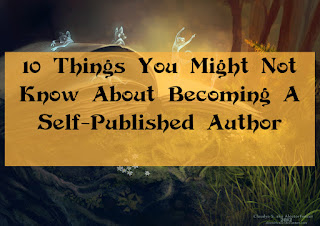Anne Lamott on Writing
"We are a species that needs and wants to understand who we are. Sheep lice do not seem to share this longing, which is one reason why they write so little." Anne Lamott.
This devotional focused on a study showing that people "who read fiction were better able to relate to their peers and to engage in social interaction." Most of us can probably realize why. So for this wandering, I want to focus on how fantasy in particular might live up to this quote from Ms. Lamott.
Speculative fiction in general can do something a little more unique than fiction, by allowing writers and readers to explore what it means to be human by studying the negative. Think of Spock and Data from Star Trek; Sonny from I, Robot; the elves in Lord of the Rings. By showcasing races that are decidedly not human, it can give us a portrait of humanity in a sort of silhouette. Aspects and emotions of humans that perhaps we take for granted suddenly stick out - in a "you don't know what you have till it's gone" sort of way.
Fantasy and Sci Fi also allow us to give human traits to decidedly non-human beings, like dragons, goblins, aliens, strange races that are humanoid but maybe look strikingly different - think the Rain Wild people of Robin Hobb's Liveship Trader series. This, I think, helps us grow our empathy skills, by allowing us to relate to, sympathize, and ultimately root for people who look nothing like us, but in whom we might now recognize humanity.
Fantasy also, more than fiction generally, allows us to explore topics that might otherwise scare us. Things that hit a little too close to home - or maybe themes that we feel like we've already made up our minds about - when given the distance from our reality that a work of fantasy allows, softens the blow. If done well, it allows our minds to wonder again. If done poorly, certainly, that book may still find itself hurtled against a far wall (I did that once). But fantasy does, to a certain extent, allow us to dismiss ideas we might fight abhorrent, or just annoying, as part of the fantasy - not something we need to bring back with us when we return to reality. That said, one of my biggest crises of faith arose from a couple sentences from a fantasy story, because it threw into question my motives. And I struggled with that question for years. But, I finally answered it to my satisfaction, and I haven't wavered since.
That's why I write, and why I write fantasy. Why do you?
This devotional focused on a study showing that people "who read fiction were better able to relate to their peers and to engage in social interaction." Most of us can probably realize why. So for this wandering, I want to focus on how fantasy in particular might live up to this quote from Ms. Lamott.
Speculative fiction in general can do something a little more unique than fiction, by allowing writers and readers to explore what it means to be human by studying the negative. Think of Spock and Data from Star Trek; Sonny from I, Robot; the elves in Lord of the Rings. By showcasing races that are decidedly not human, it can give us a portrait of humanity in a sort of silhouette. Aspects and emotions of humans that perhaps we take for granted suddenly stick out - in a "you don't know what you have till it's gone" sort of way.
Fantasy and Sci Fi also allow us to give human traits to decidedly non-human beings, like dragons, goblins, aliens, strange races that are humanoid but maybe look strikingly different - think the Rain Wild people of Robin Hobb's Liveship Trader series. This, I think, helps us grow our empathy skills, by allowing us to relate to, sympathize, and ultimately root for people who look nothing like us, but in whom we might now recognize humanity.
Fantasy also, more than fiction generally, allows us to explore topics that might otherwise scare us. Things that hit a little too close to home - or maybe themes that we feel like we've already made up our minds about - when given the distance from our reality that a work of fantasy allows, softens the blow. If done well, it allows our minds to wonder again. If done poorly, certainly, that book may still find itself hurtled against a far wall (I did that once). But fantasy does, to a certain extent, allow us to dismiss ideas we might fight abhorrent, or just annoying, as part of the fantasy - not something we need to bring back with us when we return to reality. That said, one of my biggest crises of faith arose from a couple sentences from a fantasy story, because it threw into question my motives. And I struggled with that question for years. But, I finally answered it to my satisfaction, and I haven't wavered since.
That's why I write, and why I write fantasy. Why do you?


Comments
Post a Comment